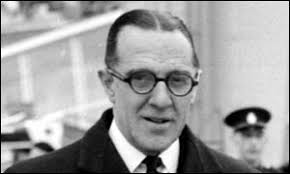DAVID ROBERTSON writes:
When I read the previous post I was especially attracted to the juxtaposition of the two principal characters, Walter Monckton (as he was in his early days) and the relatively unknown David Jennings who, as the writer acknowledges, may well have become a Kent star of the post WW1 years had it not been for his tragic death from gas poisoning.
But it was the references to Monckton both as a Kent cricketer and politician that intrigued me, especially the writer’s apparent indignation that a Man of Kent should have been invited, and had accepted, the Presidency of Surrey not just for one year but for a three year period in the early 1950s and then again from 1959 to 1965.

Walter Monckton the lawyer and politician
I wondered if it might have been a political link, maybe as a Member of Parliament representing a Surrey constituency, but that was not so. He represented Bristol West after winning a by-election early in 1951. He served in the Cabinets of Winston Churchill and Anthony Eden as the Minister of Labour and National Service in the 1951 and 1955 governments. He left the Commons in 1957 on becoming Viscount Monkcton of Brenchley.
So at a time when the Presidency of Kent often went to gentlemen of distinction, it is something of a mystery as to why he was not invited in the early years following WW2. There might however be another explanation: during Walter Monckton’s second period serving as the Surrey President, Kent’s records show that in 1961 the President was one L.R.S. Monckton.
There may be a further explanation for Walter Monckton‘s limited opportunities with Kent. It is recorded that he was “nearly blind in one eye”, not a good thing for a wicket-keeper.
Another outstanding performer in that historic Eton v Harrow match, although also on the losing side, was The Hon. Robert Alexander. In the two Eton innings he took 3 for 7 in 4.1 overs and 2 for 33 in 14 overs. He went on to become one of the outstanding commanders in WW2, and was ennobled as Field Marshal Earl Alexander of Tunis.
The one thousand word account of this historic match, conveying the drama of the two days’ play, is of course one of the highlights of Robert Titchener-Barrett’s “Eton and Harrow at Lord’s”, Quiller Press, Ltd. 1996.
[Further research shows that Walter and L.R.S. Monckton were third cousins. Both men could claim Edward Monckton (1768 – 1851) of Hale Place, East Peckham, as their great-great-grandfather. Lancelot (known as Lance) Richard Stephen Monckton was born on 29 September 1895 in Maidstone and died on 29 January 1979 at Bearsted where he lived. He was connected with the Mote CC for whom he played around 1923 – 1931, becoming joint manager of the club in 1931. He served on the Kent CCC committee from 1933 to 1936 and again from 1938 to 1947, as well as being a Vice President of Bearsted CC. He was a Justice of the Peace, but does not seem to be directly connected to the Monckton family solicitors in Maidstone, which was founded by the great-great-uncle of both men, John Monckton, in 1825. The firm still survives as survives as one of the county’s largest law firms, Whitehead-Monckton.]
0 Comments